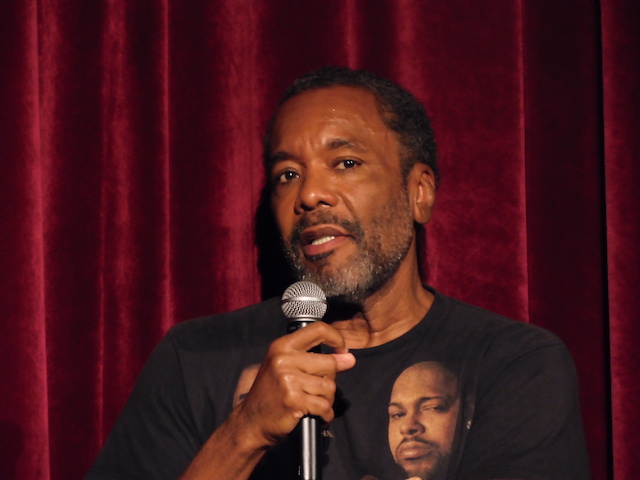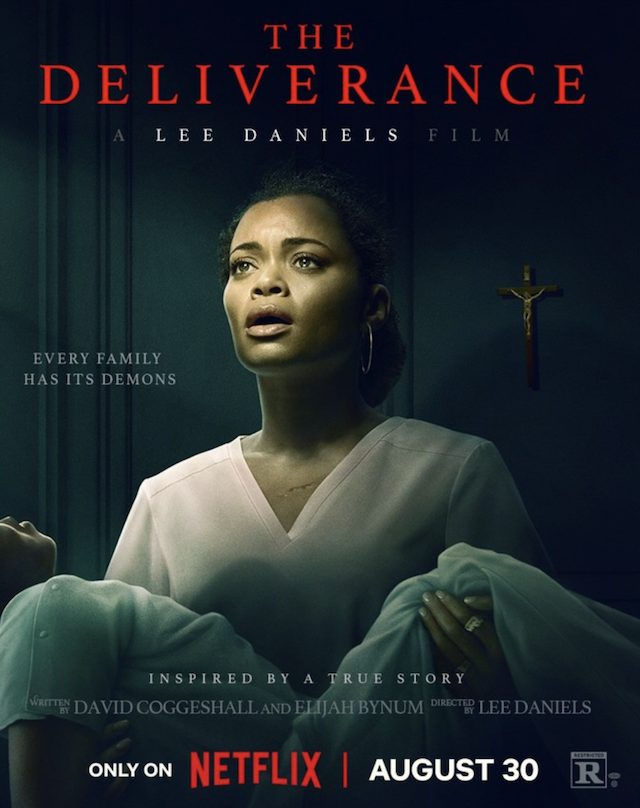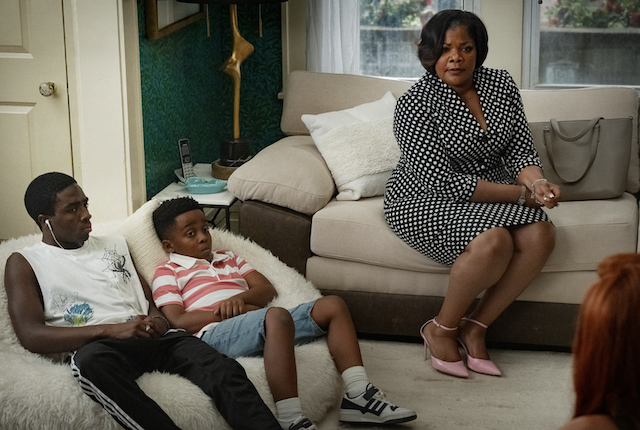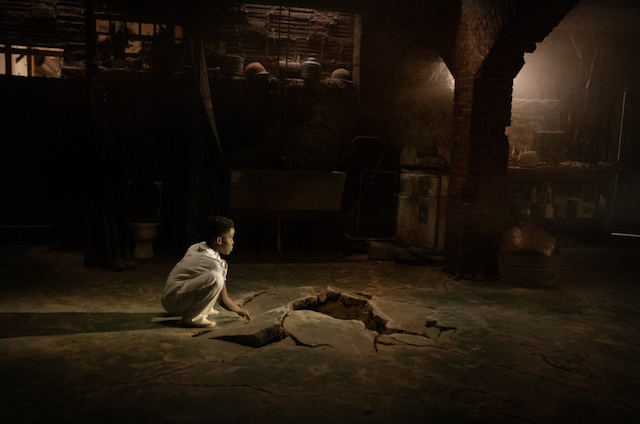

©Courtesy of Netflix
Q: When I was a kid and I saw The Exorcist. I was amazed at how real it was. That’s what you did. I’m watching the movie, I believe everybody. I believe what’s going on, and then you do the most difficult thing a storyteller can do—“I’m gonna take you here, I set the stage, everybody, here’s the world, here everybody’s a human being, and now, come with me.” I think that’s the most difficult thing to do, and you pulled it off, I love the movie. Congratulations on the most difficult thing I’ve seen you do. My first question is, were you terrified knowing that’s what you were setting out to do?
Lee Daniels: Yes, and I’m never going to do it again. (Lol) I did it because I wanted to do something I was afraid of. I wanted to check locks. The Exorcist, The Omen, Rosemary’s Baby—I wanted to pay homage to that type of cinema. They don’t get it. They want jump scare, as opposed to character scare.
Q: That’s so true. There’s no cheap horror moment. It is all earned.
Lee Daniels: I call it a fake face thriller. there’s so much going on. It’s not true horror until it is horror. All of a sudden you’re getting the love that you get from under you and you’re in horror.
Q: Is it horror? Yeah, it is. But I know what you’re saying, it’s grounded and makes you reflect and stays with you. The movie stayed with me since I’ve seen it. I love that you’re making this. It’s interesting you’re making this now as a filmmaker. You have so many tools at your disposal. Effortlessly to me: just your camera movements, the compositions of your scores, incredible. And then just how you deal with actors and every single person, the guy in the bar who says “Is everything okay? Just calm down.” Everybody, every small role is so lived in and that’s because of you. So I love that you chose to tackle this when you had the ability, as a filmmaker. How many days? What was the shoot day of this film?
Lee Daniels: I think it was a lot. It wasn’t precious. I think it was literally over 60. I blacked out. It got into a dark space. I was in such a dark space doing the film.
Q: How did you do that with the children?
Lee Daniels: That was hard, because you had the hours.
Q: Yeah.
Lee Daniels: The hours, and also the little girl. There’s moments that I had to rewrite because I just couldn’t tell her to do the same thing that the script required. I had her whisper it. Nothing. So that I’d be able to edit something and leave it to the imagination of the audience.
Q: Tell me about that. Because it seems that you must have this ability to—it’s such a well-thought-out, clearly a thought-out shot-by-shot thing, but from what I know of you as an artist too, you’re very much “let’s see what’s there and I wanna take in the moment and create something real in the moment.” So, bridging that gap with your actors within this structure how did you find yourself as a filmmaker in that moment?
Lee Daniels: Drama is the thriller experience. It was more like (snapping his finger) taking on his rhythm and then trying to find the truth in that one.
Q: I actually understood what you said. That makes a lot of sense.
Lee Daniels: I brought this gibberish geometry to you guys..
Q: But yeah, it’s all rhythm, that’s for sure.
Lee Daniels: It’s hard to do. And that’s why I wanted to do it. I think I wanted to do something different. And this script had come to me right after I’d done Precious. And I didn’t want to do it because I felt like I addressed the abuse issue with Precious. And I also felt I believe in spirits, both good and bad. And I thought that’s the way I work, that the spirits were coming. And I was like, I ain’t. I’m not. Then I realized many years later, that we’re in some dark times. We’re in some really dark times. And for me, it’s about Ebony’s journey in finding her higher power. For me, it’s Jesus. For others, it could be Allah, or Buddha, or yourself even. But I think that we are in the darkest of times. And I wanted to scare you to your higher power.
Q: And that’s one of the things I like about it, because clearly you’re exploring all of those themes, but you’re doing it so studiously within the genre. And that’s what’s so dope about it. Your lead actor, Andra Day, tell me about that progression from Billie Holiday to this.
Lee Daniels: I had to find somebody that was—to take it on, I had to find a believer. Someone that believed even more than I did. And she is a very spiritual woman. And there’s a scene at the end where she is speaking in tongues, where the devil’s there.
And I wrote something, and she was supposed to say that something, but she started speaking in tongues. It wasn’t scripted. And my AD was like, sir, should we cut it? No! This is that one talking! Cameras roll. And so I literally let it roll until she was exhausted in tears, like a pulp, and then I say “cut!” Because I knew the spirit was there.
Q: It seems like you’re saying just let the cameras roll, but clearly you had a camera up here, she’s up here in tongues, she’s down there, it’s all lit, and there’s smoke. It sounds like there’s way more that went into that, you’re saying that those shots were all set up and then she started speaking in tongues…
Lee Daniels: She was supposed to say some things.
Q: She was in that exact setup with all those cameras…I see.
Lee Daniels: And that was one take.

©Courtesy of Netflix
Q: So you had them going on. Oh, wow.
Lee Daniels: Yeah. And I didn’t wanna take it again. I was like, we got it. Let’s get outta here. But I didn’t know that we would get it. I was prepared to do the dialogue that was written. Andra is a brilliant actor, and I think that she is a brilliant singer and…
Q: It’s you two together, that’s the film. And everything else. But yeah, she’s just, what you two make together. What kind of safety she must feel with you, that’s what’s so clear. For her to be willing to do this. The trust that she must have in you is just incredible.
Lee Daniels: Yeah it’s pretty special.
Q: How did that happen? Is that just chemistry?
Lee Daniels: No, it’s my understanding, no we tried it with Billie Holiday. And she didn’t understand because she had never done drugs before. And I did, I’m a recovering addict. and so she—I just took her on my journey, my life journey, as a drug addict. For what it was like to get high. And what it was like to have a brain that was that of an alcoholic. and when I saw her trusting me, with Billy, and not judging me, like no judgment. Okay, this is what it is? I got you. I got you. I said, wow, okay, she gets it. And the same applied to this right here, because she was an alcoholic. She doesn’t smoke, and so I had her smoking at Billy and in this, and now she’s been taking cigarettes, and I’m like, what? I gotta get her off the cigs.
Q: Glenn Close. Wow. Okay. … Tell me what made you think of Glenn Close, if that’s how it happened, and then that journey.
Lee Daniels: Okay it’s based on a true story, or my interpretation of this story. And so I wanted to step away from it because I didn’t want—I only spoke to LaToya a couple of times in the process. And I really wanted to figure out how to change it up a little bit so that I could make it my own. And I have so many biracial friends. And I wanted to explore what it was like, because Black people know this woman. This woman is a part of the fabric of the Black community that we never get a chance to see.
And a lot of white people don’t know her because she exists only in this Black world. And so she’s a woman that only dates Black men. A white woman that only dates Black men, and has a Black child, and has Black for a grandkid. And so what is that like to exist? What is that like for Ebony to be a Black woman to have this white mom? And what is that friction? What is that all about? And that was all to trick you, to have you not look into the closet to throw you off. What is, what’s happening here? So Glen was like, “What am I doing? What am I doing? I had her put on weight, and then I had the costumer take the clothes in and she says “What is this?”
And she said, it was after speaking to Monique and after speaking to Anjulee and Andra, she walked away with a different understanding about what Black women feel about body positivity. And that blew her mind because she had this one idea of what body positivity was, and so now she understands through the Black lens.
Q: And when you saw her understand that and you watched her, that’s when you felt like she found the character.
Lee Daniels: It was in her strut. Post hack, call it post hack. Yeah. I was like, okay, you’re getting it. Let’s just get her walking. Cause she tapped into it, dropped into it.
Q: And Monique, oh my gosh. You had a scene where they (Andra Day and Monique’s characters) were both in the chairs and she’s talking about her job. Can you just talk me through that day?
Lee Daniels: I think that Black women are not believed even with Kamala Harris right now. Black women are not believed. When women aren’t believed. Black women especially aren’t believed. When Black women don’t believe Black women what is that about, really? That was a painful scene for me, because I’ve known so many women in that situation that had their children taken away from them, for bullshit reasons.
We just tapped in, man, and we did it and that was actually I think it was Monique’s first day, maybe. At the end we had spoken. We hadn’t spoken in 15 years, it was like riding a bike again. I love her so much. I think that she is a profound, brilliant actor. And then they’re crazy. Honestly, I say, Glenn, and Monique, y’all don’t like each other, and that is formidable—those are the two of them together. I wish I had written a scene just for the two of them together.
Q: Yeah, I wanted that. She left the house so fast. Don’t let that bat scare you. She left the house in a second. That was funny, yeah, I loved that. Can I just circle back to the kids again? Just the young boy. Yeah, incredible.
Lee Daniels: The youngest kid AJ. I produce a television show called “The Wondering Years.” They cancelled it, but it’s the Black version of “The Wonder Years” and he was a guest star on it, and I thought he was phenomenal. And he has an old soul. and he—I could talk to him like a 65-year-old man. And he got it. And the dad was good. And everybody in was, “he’s very spiritual, and he got it.” And Demi, who also played, was in the Will Smith movie, “King Richard,” about the tennis girls, Serena Williams. She plays Serena Williams. Really talented girl. Yeah. She got it. And it was just like when you find the right actor, when they’re willing to jump off the cliff with you.
Q: Yeah, but they jumped off a cliff, a very high cliff. And it’s really so that’s why I’m so curious how just even watching his little hands around her neck and the floor, I just thought, how did you even—how did you create all of this? The level of trust in everybody to be willing to just do that, especially seeing it a second time. How did you create this world where these people were so willing to inhabit and jump off of that very high cliff without ever winking at the audience, believing it 100 percent? There’s a real sense of innocence to everybody in the movie.
Lee Daniels: I think the trust comes from knowing that I’ve been there, and I’ve been to a dark side. I don’t have a problem talking to the dark side. That’s the part of me—we all have demons in us. The hard part really was praying, trying to make sure that before we shot anything, everybody prayed. And in this day and age, you’re not allowed to pray. I was told by Netflix You can’t call it, I gotta call it, recharge, pray. I said, I don’t know. Ok. I had to, and we had a guy that did deliverances there, praying with us every day. Because I read the system and the spooky things that happened. I didn’t want to–you know what I mean? We were praying hard. And those that didn’t want to pray and there were a few that didn’t want to pray, except to the girl.

©Courtesy of Netflix
Q: Did you have a crew call kind of thing every day?
Lee Daniels: Every day and then days before we jumped into scenes. Every scene. Again, it was about me finding my higher power. I needed to, I was in a dark and cold place. I call you. You know where I was at.
Q: I didn’t really, now I do. Should’ve had a longer conversation. You’re good. That house, the production design. The screen painting, I just recently read, so that’s the screen, right? The sort of version of the screen, right?
Which, tell me if I’m wrong, but the artist did that because I just happened to read this, maybe I’m just remembering that Nietzsche was talking about God is dead, and that was the reaction to that idea that God is dead. And I was like, oh, I just realized, oh, that’s why it’s there, because God is dead.
And they need to realize that he’s not correct? You got that, yeah. Yeah, okay, good. But just all the specificity of everything. What was your pre-production like? Is this a production liner that you worked with before?
Lee Daniels: When I worked on my first film, they always told you “you don’t have enough money, you don’t have enough days.” And you just make it work. And I’m used to this. I’m used to work. This is the biggest budgeted project I’ve ever worked on. And I’m used to working with Precious. Two, paperboy, two nickels to rub together. This was a playground for me.
And it was I change my mind all the time. You change your mind? Yeah, of course. Then you feel guilty about changing your mind?
Q : Yeah, of course.
Lee Daniel: That white boy over there.
Q : I wanted you to know just that was big of me to just say that. I’m growing. I took a leap just then.
Lee Daniels: Yeah I changed my mind a lot. What was the devil? I didn’t understand. The hardest part was trying to figure out who the devil was. Literally, we had devils down in the basement, we’ve shot it, and no, that’s not the devil. And then I realized the devil wasn’t her. The devil was all of us. So I changed that.
Q: Oh, interesting while you’re shooting.
Lee Daniels: Oh, I lost their mind.
Q: I don’t know what the movie’s about if it’s not in that sort of whole thing you’re telling.
Lee Daniels: People [want to find out who the devil was. I kept thinking, what is he looking [for]? He shifted, man. Exactly, I was like, I had this new beautiful white guy that was like, you know the devil, and saying, come to me.
Q: I was like, oh really? Oh wow.
Lee Daniel: And then I realized that the devil is in–I am my worst enemy. and once I realized that, the light bulb went off. And then it became trying to get more to get Andrew to play it. But that’s the whole movie.
Q: Yeah that’s it. That’s the entire film. Right?
Lee Daniels: Yes. I think that it’s–again, it’s about finding your higher power. And it’s not, I’m not here to jump scare you with anything. I just think that Bradley, I think we’re in dark times. And I try to, whenever I’m doing something when I did it—”Empire,” my television show, it was really about homophobia. It was about homophobia in the Black community. I was tired of being bullied. I was tired of feeling weird about being gay and everything. And I realized that changed. Change the whole–all of a sudden it’s not that. And in doing that, as I was worried about Cookie’s hat and, or the music that they were singing, I didn’t realize that I was creating Black Panther and Insecure and all of that.
We had paved the way for the Black Renaissance that was happening. And that’s what I think my gift is—I’m a little psychic about what’s happening right now, and I just think that we need to buckle up. And pray.
Q: And the idea that it doesn’t have to be bigger than just us, and you can start by working on yourself. And that’s what I love in the end when you decided to, which I’m so glad you did have her, battling with her she’s you need me we’ve gotten this far which I think, and I can relate to that. It’s no, you can let go of that, let it grow, we can grow. That’s the reality.
Lee Daniel:Yes.
Q: If you work at it, you can grow and change. And that’s a beautiful thing. And that’s really to me what the movie’s about–exploring through this genre, which is a very tall order, and…
Lee Daniels: Which I’ll never do again.
Q: You don’t need to. You did it. Thank you.
Lee Daniels: Yeah. Thank you very much.
If you like the articles, share your thoughts below!
Check out more of Nobuhiro’s articles
Here’s the trailer of the film.

